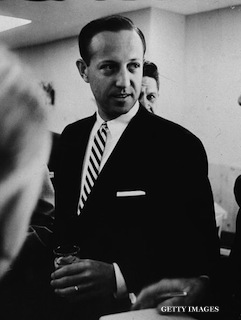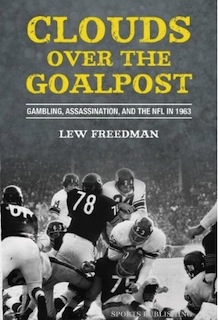There's the unmistakable buzz in the air, like the droning of a stadium filled with rabid fans when the ball is placed upon the tee building to the inevitable crescendo at the opening kickoff. Such a metaphor specific to the sport of football as a whole can also be used to describe the commencement of another season in the NFL, its 94th.
In my impatience to get to that opening kickoff, this summer I read Lew Freedman's Clouds Over The Goalpost: Gambling, Assassination, & the NFL in 1963. It represents a sort of time machine, transporting us back to when the league experienced growing pains and whose allure to the public was threatened on all sides.
And as much as has transpired in the past 50 years as the league has blossomed since that adolescent phase, it's fascinating to see the similarities to that game and today's, both stylistically and culturally.
Even with 40-plus years of fermentation behind it, the NFL in 1963 was still nowhere near the juggernaut we see today. In fact, the truth is, it was well behind horse racing, boxing, the college version on the gridiron, and, of course, baseball, the national pastime, in terms of popularity.
The title of the book refers to the scandals and national tragedy a league, run by a young commissioner, had to endure to keep on track with a vision of prosperity.
The league in 1963 was in a time of transition. Pete Rozelle had only been on the job a few years and was out to protect the league's image while taking advantage of the newer medium of television and its ability to reach the masses. And he was to find himself up against a blitzing defense on fourth-and-20 every step of the way.
It was supposed to be a great season, where rivalries were hot and the games were fierce. The Green Bay Packers were two-time defending champions, led by a man who, one day, would have a championship trophy named after him, fielding players named "Ringo" and "Starr" at a time when there was a band across the pond doing the same. Their hated rivals, the Chicago Bears, similarly led by a legend, George Halas, who in September of that year, was among the inaugural class in Canton, were out to dethrone them.
Yet the champs were about to lose their best running back from their league-best offense to a charge of gambling -- running back Paul Hornung. Along with Detroit All-Pro defensive lineman Alex Karras (he of "Mongo only pawn in game of life" fame), they were suspended by the commissioner for the full season. Most players (even those relieved to see these two stars sitting on the sidelines) were repulsed by the commissioner's brazen decree. (And you thought Goodell was in a league of his own.)
As if that wasn't enough, another star, defensive tackle Gene "Big Daddy" Lipscomb, a behemoth of a man, was found dead less than a month later, of a heroin overdose, the needle still stuck in his right arm. The official report said a self-inflicted overdose, an impressive feat for a right-handed person that was afraid of needles.
Regardless, it ran counter to what Rozelle was trying to showcase to America in his attempt to increase ratings.
Add to that, an upstart new set of professional teams, the American Football League, was challenging for supremacy with a more fast-paced, wide-open passing game and stars named George Blanda, Jack Kemp, Geno Capelletti, Cookie Gilchrist, and Lance Alworth, a.k.a. "Bambi."
The old school NFL, meanwhile, was confident in its grind-it-out, smash-mouth style (a discrepancy still seen between many NFC and AFC teams to this day) yet still worried about their standing.

Eligible players could be drafted by both leagues. Essentially, they were free agents to be courted by either side. The NFL would babysit these picks, keeping them well-guarded in hotel rooms, in an effort to prevent contact with the enemy and the rival league's recruitment tactics.
Plus, they would bad mouth the AFL, degrading them to recruits while the newbies would speak only of their attributes, the positivity being a selling point to many rookies.
The AFL had their troubles too, of course, where the defending-champion Dallas Texans decided to relocate due to low attendance numbers, opening the season defending their crown in Kansas City as the Chiefs. The Titans changed their name to the Jets, and the Chargers were still in Los Angeles before leaving for San Diego. (Gee, Los Angeles lost a football team. Shocker.)
Then, with internal affairs and external competition providing resistance to growth, the most devastating news of all hit, reminding a nation that football was merely a game -- Friday, Nov. 22 and the assassination of President John F. Kennedy. Rozelle decided to play the games two days later, earning him much criticism. (Imagine Roger Goodell doing that today with 24-hour news stations and approximately 420,000 talking heads with opinions. He could only hope that Miley Cyrus does something at the same time to divert our attention.)
A few years later, the league would form a merger, as the old adage goes, "If you can't beat them, add them to your schedule and play one division in the other conference on a rotating basis." But in 1963, there was a lot of insecurity, and uneasiness about the league's future.
Clouds Over the Goalpost is an anniversary present to the fan, a snapshot providing a chance to see where it was and how far it's come, but also to see that the league has always faced and still faces challenges -- from concussions to PEDs, personal conduct issues, finding a team for Tim Tebow, etc.
There's no guessing where it's going, but one thing's for sure -- the NFL, now the most popular sport in America, is in a far better place as it has aged like a fine wine, captivating us with every sip, and promises to continue for the foreseeable future.
And now, put the ball on the tee and let the games begin!





